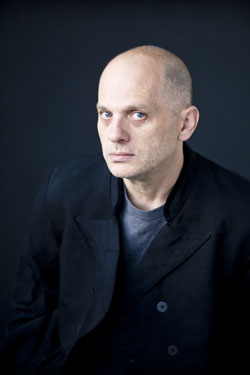
The Pulitzer-winning composer David Lang wasn’t always a revered figure of the city’s new-music scene. He started off like every other musician, unknown and rejected, and that prepared him for his latest role: writing the music for the film (Untitled). Adam Goldberg plays a tortured composer named Adrian, whose compositions (some beautiful, some ridiculous) are written by Lang. A founder of the now-iconic Bang on a Can collective, Lang drew on his scrappy early years to channel Adrian’s passion and angst (fun fact: his Soho building’s entrance doubles as Adrian’s building in the movie). Lang spoke with Vulture about composing for a specific character, and writing silly songs.
How did you get involved with this movie?
Jonathan Parker, the director, got in touch with me before he was very far along. He said he was doing a film about a guy who writes very silly avant-garde music. He falls in love, and right at that moment, he composes something really beautiful. Jonathan had heard this piano piece I wrote and wanted to use it for that. I had never done a film before, other than the orchestration for Requiem for a Dream, so I quickly jumped in and said, “I can write the really silly music too!”
Did you help create Adrian as well?
As the script was getting written and rewritten, I would make comments about what a composer’s life is like and what contemporary music really means. One of the points I made from the beginning is that even the weirdest, silliest people in my world really believe in what they’re doing. I wanted Adrian to be a passionate experimenter, but not a charlatan. What makes the world of composers and musicians and artists work, the world that I live in, is that no matter how ridiculous something is, it’s done by people who feel it’s necessary, and that the world will benefit. You actually do believe there’s something Utopian about it. “I’m gonna do this stuff, and if I do it exactly right, the world will change — that’s what I’m here for.”
Adam Goldberg has said Adrian’s devotion is almost religious.
Yes. Creating is a real act of faith. That’s why I really was happy that the characters in this film believe it themselves. Like the scene where Adrian is waving an American flag as part of a performance — it’s so hilarious, but it’s like, this is an expression of your artistic character! All of the things Adam does in the film are so committed — which is why they’re also so funny.
How were you able to keep the music from veering into caricature?
Adam and I first met at a recording session at Looking Glass Studios in the city. I had made all these really wild and stupid imitation sixties pieces. And I made him yell all these weird things really loud, which he got into completely. I think that set the tenor for how all the pre-falling-in-love musical experiences would go for him. It was a weird job for me, the whole thing. Usually, music in a film has to be in the background, and help with mood changes. But I had four different jobs: creating music that was not supposed to be taken seriously, music that was supposed to be taken seriously, music performed onscreen as real music, and then regular background music.
There’s that scene when Adrian goes to the concert of a fictional éminence grise composer named Morton Cabot, whose music was also really written by you …
It’s a piece of mine called “The So-Called Laws of Nature,” for percussion quartet. They’re playing teacups and flowerpots. The most flattering thing for me was that Adam’s character goes to the concert of this 90-year-old guy who’s supposed to be the greatest composer on the planet, and it’s my music. I’ve got 40 years left!
Did you ever go through a ridiculous phase like Adrian?
You can say he’s the kind of lost person who can’t figure anything out, who’s comic and uncommitted, but I actually chose to look at it differently. It’s not like Adrian lives in this world of dopey music and then all of a sudden falls in love and writes something beautiful. The point is that he hasn’t found the way to express himself yet — it’s the actions he’s taking to discover what he does. That’s how I identified with him. It wasn’t, “I used to write stupid music, now I don’t.” Though maybe I still do.




